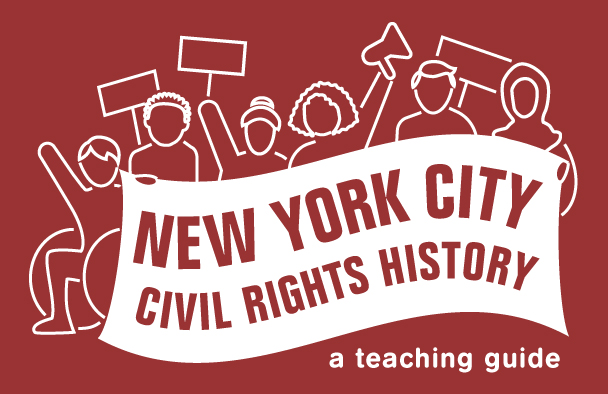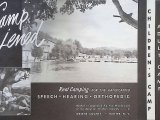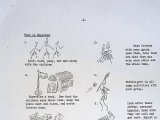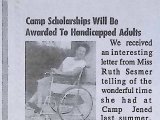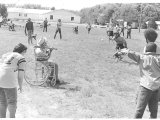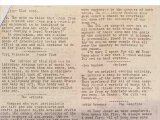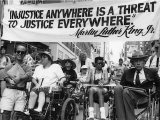You are here:
Camp Jened
Steven L. Sles went to summer camp when he was 13. The day started with the pledge of allegiance to the flag. After some chores and cleanup, campers participated in a range of activities including arts and crafts, music, theater, swimming, and photography, all before lunch. In the evenings, there was a campfire where campers and counselors shared stories and roasted marshmallows. Steven attended Camp Jened in the upstate town of Hunter, New York. Sles, who had cerebral palsy, called his camp “A Haven for the Handicapped.”1
Read More
Camp Jened was the first camp of its kind in the United States designed for Disabled young people, like Steven, as campers. Jened opened in 1953 so that Disabled children, teens, and adults could enjoy an outdoors, rural, summer camp experience. Many of the activities Steven and fellow campers recalled were common for children who went to summer camps, but most summer camps at the time excluded Disabled students.2
In the 1950s many Disabled young people lived in institutions. Those who did not were often denied access to school and recreational programs. Legal protections for Disabled students like the Education for All Handicapped Children Act (1975) and the Americans with Disabilities Act (1990) were not yet law.3
Leona Burger and Honora Rubenstein—who had worked in special education and with children who had cerebral palsy—co-founded Camp Jened with support from other campers’ parents and the United Cerebral Palsy organization.4
About ninety campers arrived in July and spent eight weeks at Camp Jened. Campers had different disabilities and came from different racial backgrounds, although most were white people. Some, but not all, came from New York City.5
The camp made sure that its physical facilities were accessible to its students, and that medical services that campers needed were available as well. Some of the counselors were Disabled people, and all of the staff were trained in supporting Disabled people while they were at camp.6
Camp Jened became a touchstone of the modern disability rights movement. Many Disabled campers and the counselors who worked there went on to be influential disability rights activists in the United States. The Camp Jened community kept in touch, and the work of these activists led to the passage of legislation that required accommodations to include Disabled people in everyday life, from school to the workplace to recreation.7 Camp Jened was revolutionary in the ways that it celebrated, uplifted and supported Disabled people. Camp Jened closed its doors in 1977, but its impact is felt today.8
-
Steven L. Sles, “A Haven for the Handicapped,” January 18, 1954, Collection of Honora Rubenstein. ↩︎
-
Crip Camp, directed by James Lebrecht and Nicole Newnham (2020: James Lebrecht, Nicole Newnham, and Sara Bolder), netflix.com; “The News Published By Ruth Kirzon Group for Handicapped Children, Inc.” and Florence Vogel, “Excellent Results Reported By Camp Committee,” Collection of Honora Rubenstein. ↩︎
-
Kim E. Nielsen, A Disability History of the United States (Boston: Beacon Press, 2013). ↩︎
-
“Utica Therapist Co-Owner of Special Camp,” Utica Observer Dispatch, March 6, 1953, Collection of Honora Rubenstein. ↩︎
-
“Utica Therapist Co-Owner”; Jackie and Jeff Rubenstein, interviewed by Jasmine Leiser, April 19, 2023, via Zoom. ↩︎
-
Newnham and LeBrecht, Crip Camp; Denise Sherer Jacobson, interviewed by Jasmine Leiser, April 4, 2023, via Zoom; “Camp Jened To Continue Treatments,” New York Herald Tribune, April 30, 1953, Collection of Honora Rubenstein; “Disabled Kids, Adults Attend Upstate Camp,” Sunday News/New York’s Picture Newspaper, May 1, 1955, Collection of Honora Rubenstein; “Camp Jened—Real Camping for the Handicapped,” mid-1950s, Collection of Honora Rubenstein. ↩︎
-
Newnham and LeBrecht, Crip Camp; Jim LeBrecht, interviewed by Jessica Murray and Jasmine Leiser, April 28, 2023, via Zoom; Reunion Remarks, Collection of Honora Rubenstein. ↩︎
-
Camp Jened later reopened in 1980 at a different facility, and continued until 2006. ↩︎
